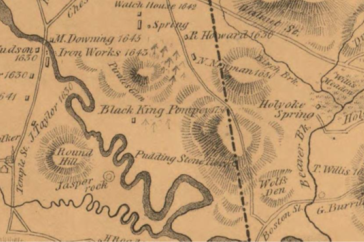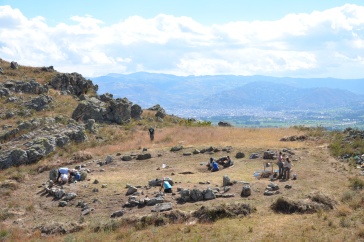https://www.montshire.org/programs/program/weaving-strands/climate-stories

This summer, students from UNH and Royal Thimpu College (RTC) in Bhutan travelled to each other’s communities and collected audio stories from locals who work the land in New England and Bhutan. Students from UNH and RTC collaborated to gather, listen to and edit narratives that represented how the changing climate is impacting the landscape, wildlife, hydrology, farming and food sources in both regions. UNH and RTC have many parallels: both serve predominantly rural and small town populations in regions that are dependent upon the land for their livelihoods. Their students are also well-positioned to be stewards of the environment for the next generation.
UNH students traveled to Bhutan in May-June, 2017, met their Bhutanese peers and formed teams to interview farmers, market sellers, and other local community members in Bhutan. Six weeks later, students from Bhutan flew to the US to visit farms, communities and a ski resort in New England, meeting with road crews, hunters and hydrologists.

After collecting the interviews and compiling the narratives, students, along with the museum staff and other project members, created an exhibit on culture dimensions about climate change which was displayed both in the Montshire Museum of Science, Vermont and the Folk Heritage museum in Bhutan.
The exchange was powerful for all participants, in several instances transformational. Each student in the program connected the narratives that they heard to their own lives in different ways. Caitlin Burnett, a student at the University of New Hampshire whose family has lived on the same land for eight generations, found resonance in the research:
“I learned some things about myself...I remember getting home and feeling different. It helped me find my roots, and reconnect with the environment. This has helped me recognize the importance of my family’s land. It has made me want to protect it and take care of it so I can continue to pass it on to future generations.”
Pema Eden, a student at RTC comes from a family with a history of caring for the environment. Both her father and grandfather are foresters, and their commitment to the protecting the environment has been passed down to Pema through family conversations and many trips to Bhutan’s forests. However, she always felt like she did not have the communication skills to advocate for environmental stewardship in others. Interviewing local people and creating podcasts from those narratives gave her the confidence she needed. “Through this project, I learned how to communicate with people,” says Eden. “Interviewing the people was very challenging at first, but through this project, I learned I could approach people and have conversations with them.”
Along with the students the faculty at UNH and RTC also got an opportunity to collaborate and understand how people living in different cultures merge formal, informal, traditional, and Eurocentric knowledge systems in order to make decisions about environmental issues faced by the communities. Sameer Honwad, a faculty member in the Department of Education, one of the project leads, explains:
Research has shown that successful environmental decision-making in communities across the world involves combining both traditional and Eurocentric science knowledge. Thus this project was an opportunity for us to collect further evidence about how people situated in different cultures merge knowledge from several sources while making decisions about environmental issues faced by their communities.
The project Weaving Strands of Knowledge: Connecting culture and science to climate change is a collaborative effort between five institutions. The project, funded by the American Alliance of Museums, brought together; The University of New Hampshire along with The Montshire Museum of Science in Norwich, Vermont, The Tarayana Foundation/Folk Heritage Museum in Thimpu, Bhutan and the Royal Thimpu College in Bhutan. This unique partnership continues to expand through various upcoming initiatives: UNH students and project faculty from UNH and Montshire Museum will perform a live, public reading of the climate stories produced by students to a campus-wide audience on November 30, 2017. Additionally, discussions to put together an installation of the student-produced story exhibit are underway with the University of New Hampshire Museum. Along with the dissemination of current materials the project partners have also started thinking about the possibility of designing a science center in Thimpu, Bhutan. Finally researchers from UNH are collaborating with researchers from RTC in order to think about different models of community based participatory research that can assist with climate adaptation and resilience.
-
Written By:
Andrew Coppens | Education | andrew.coppens@unh.edu | (603) 862-3736 -
Written By:
Sameer Honwad | Education | sameer.honwad@unh.edu | (603) 862-5301
















































